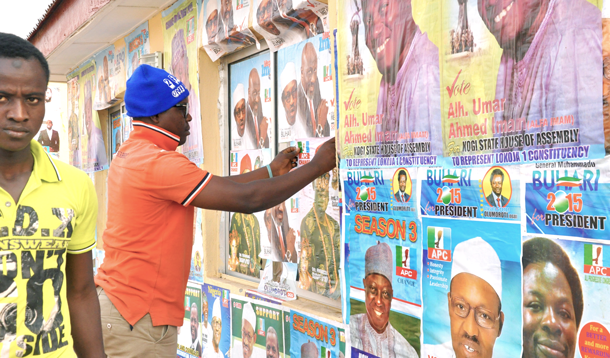
On 29 May the flags will be flying in Abuja. International dignataries will be in the Nigerian capital to see Muhammadu Buhari sworn into office as president. The event will be more than just protocol. This is Africa’s most populous nation and it’s biggest economy. And for the first time since independence 65 years ago, its citizens have changed their head of state and their government through a peaceful democratic election.For once, “landmark” is not an overstatement.
Over almost two days, on 28-29 March, Nigerians queued peacefully to confirm their identity and cast their votes, despite occasional technical hitches. And over two more, in an ambiance stretched by excitement and uncertainty, they listened as the ballots were counted and the results declared, state by state, steadily revealing how Buhari had secured a clear victory over the incumbent, Goodluck Jonathan.
And then, as they waited for the last few declarations – from opposition strongholds in the north-east – news broke that Jonathan had telephoned Buhari to concede what was now certain defeat.
Relieved opposition supporters could celebrate, while Jonathan’s voters could justifiably point out how his act of statesmanship had allowed the electoral process to come to a peaceful, and broadly accepted, conclusion.
For Nigeria, this was a seminal moment. But it could prove equally important for Africa as a whole. Formally, democratic structures prevail across most of the continent. Harsh authoritarian dictatorships are no longer the norm. But in many sub-Saharan countries, the degree of real political choice on offer remains limited, because elections are controlled by the regime in power, and the opposition is intimidated or split into myriad factions.
And there are states where opponents may win the odd local contest or parliamentary by-election to fill a vacant seat in the legislature, but where the government squashes any challenge of a scale that could threaten the established order. Incumbent rulers often seek to present themselves as the sole guarantors of stability, good order and effective economic management. And there is a tendency to argue that the progress of recent years would all be thrown away if anyone else got control of the levers of power. They hint at the communal antagonisms and battles for privilege and influence that would supposedly be stirred up if they were no longer in place to provide unifying national leadership. The suggestion is that changing government is just too risky and difficult.
However, such arguments will look less plausible now. Nigeria is a complex society of 180 million people, many different ethnicities and interests, facing a serious violent insurgency. Yet this did not prevent the country from organising a calm nationwide presidential election, which saw the incumbent gracefully accept defeat. Admittedly, it is not the first sub-Saharan country to see power change at the ballot box. Benin, Ghana, Mali, Niger, Senegal, Zambia, for example, had already taken that step.
But its huge population, economic clout and international profile, puts Nigeria in a different league. So the example it has set could have a wider impact. What Nigeria does is noticed. What it says matters.
The impact of its example may vary from region to region. Africa is not homogenous. In parts of the continent, long-serving regimes appear unwilling to cede control of the constitutional agenda, maintain term limits or open the door to wider democratic choice. In Congo-Brazzaville, government supporters are already lobbying for abolition of the rule that currently bars President Denis Sassou-Nguesso from seeking a third successive seven-year term.

But in West Africa the sense of regional identity is stronger – and attitudes towards political reform are more positive. It is here, among its neighbours, that Nigeria’s recent actions will be most influential, particularly because it will be building on the progress already made by other countries in the region.
The Economic Community of West African States (Ecowas) bloc already has a formal commitment to democratic principles. Out of 16 member countries, Gambia is now the only one that is governed by an old-style authoritarian regime.
Togo has just staged what was its freest presidential contest in decades. In Burkina Faso, this year’s election is wide open, following the people-power overthrow of Blaise Compaoré, who had dominated the country for 27 years. Of course, there are blemishes on the regional canvas. In Guinea, five decades of repressive dictatorship have been swept away, yet there are still regular heated clashes between the security forces and opposition demonstrators. Deaths from live army or police gunfire are not that uncommon. The 2010 election was marred by violence and allegations of abuse.
But this is now the regional exception. The basic principles of democratic choice, and politicians’ readiness to accept electoral defeat, are becoming the Ecowas norm. This has wider impacts on the functioning of politics and power outside the electoral cycle. Governments find themselves exposed to more scrutiny, from the media and from parliaments; opposition parties increasingly learn to rebuild after national defeat by winning office at local level and delivering services and infrastructure as mayors or state governors. That spreads power too – and diversifies relationships with the international community as donors negotiate directly with local leaders over funding for community projects.
Huge problems persist of course: poor management, corruption, a shortage of skilled staff, administrative inefficiencies, personalised patronage. But the governance of today’s West Africa is becoming more accountable; the region’s politics now offer its people some choice over who rules over them; power is no longer monopolised to the degree still seen in many parts of the developing world.
The direction of travel was already clear. However, Nigeria’s 2015 election has given it critical momentum.